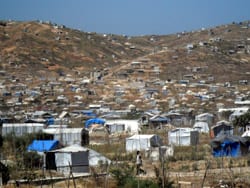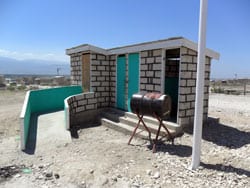Richard Atkinson, Finance Manager for Oxfam in Port-au-Prince writes about a trip to see our humanitarian response work in Corail camp where Oxfam is responsible for providing water and sanitation to two camps sections.
 Richard Atkinson, Finance Manager for Oxfam in Port-au-Prince
Richard Atkinson, Finance Manager for Oxfam in Port-au-Prince
I rarely stray far from my desk. Although I am working on the earthquake and cholera response in Port-au-Prince, Haiti, my assignment as finance manager keeps me in the office. If the opportunity to see my colleagues’ work arises, I take it. It really helps me to connect the stack of contract and payment documents on my desk with something physical. When John Kanani, Public Health Engineer told me that he was going to hold a meeting with masons at Corail camp, north of the city I asked if I could come along.
Corail camp was opened last April, in the wake of the January earthquake. Oxfam is responsible for providing water and sanitation to two camps sections. The “temporary” toilets and washing facilities Oxfam installed when the camp opened need replacing with more permanent structures. There are plenty of masons and other skilled workers available for this kind of work. Oxfam is keen to make sure that our contractors employ local people. That way we can provide both essential services and a source of income.
The drive from the office to Corail skirts the centre of Port-au-Prince. The chaotic suburbs bustle with activity. There are walls covered in colourful paintings, elaborately adorned ‘tap tap’ buses, smartly dressed school children and well stocked markets. This far from the centre of the city, the only evidence of the earthquake is the occasional pile of rubble.
 |
| A view of Corail camp, some 30km north of Port-au-Prince. |
Corail camp itself is a different matter. Neatly organised rows of box-like houses stand against a backdrop of the Chaîne des Matheux Mountains. . These are a major improvement on the earlier tents, many of which now dot the surrounding hillsides as more people are pulled to the area. There are few people about and the only colour in this landscape is the brilliant blue sky. We park the car near a newly built school. The ground is hard as rock and stony. In the sunshine, its whiteness almost dazzles. There is dust everywhere.
We are greeted by Barbara Dorcé, Oxfam’s Public Health Engineer Officer in the camp. She will manage the morning’s activities. People begin to emerge. Eventually, about 60 men crowd the tent making the most of the available shade. Others, including the camp police, drift past to see what is going on. John wants to know that those present are all masons. Everybody shows their worn and dusty hands, proudly pointing to any calluses. Many nod vigorously when asked if they have tools provided by Oxfam as part of a secure livelihoods initiative. Some have their tools with them. John outlines the construction plans and asks that those present to form teams. The intention is that the contractors will hire these teams. The best performing team will then get a contract of their own.
 |
| New toilet block in Corail camp, Haiti, with wheelchair access and oil drum handwashing sink. |
The meeting is accompanied by the constant sound of machinery on nearby construction sites. The camp is already host to over 9,000 people and continues to grow. When we finish, John shows me some of the more permanent works – toilet blocks with lockable cubicles assigned to groups of families, solar powered security lighting, ramps to allow access for people with disability and adapted oil drums containing water for hand washing. The last is of particular relevance while cholera is such a huge threat.
Haiti remains politically paralysed. The election process began months ago and has been a huge source of uncertainty and disruption for everybody in Haiti. In the mean time hundreds of thousands of people remain dependent on temporary shelter and services. Sadly, the overriding impression I get is that the camps are beginning to feel permanent, as residents settle in and see no practical alternatives. Hopes are now pinned on run-off elections for the presidency next weekend to bring a much needed boost to redevelopment efforts. Oxfam and other agencies have continued to support the camps throughout this difficult period. Despite all the gloomy news, my visit to Corail showed me that we are still bringing practical benefits to people made homeless by the earthquake.
At the camp entrance, two tents have been converted into makeshift restaurants. Local enterprise is beginning to creep into Corail. We stop briefly for chicken with rice and sauce, then I head back to Port-au-Prince and a heaving in-tray.



